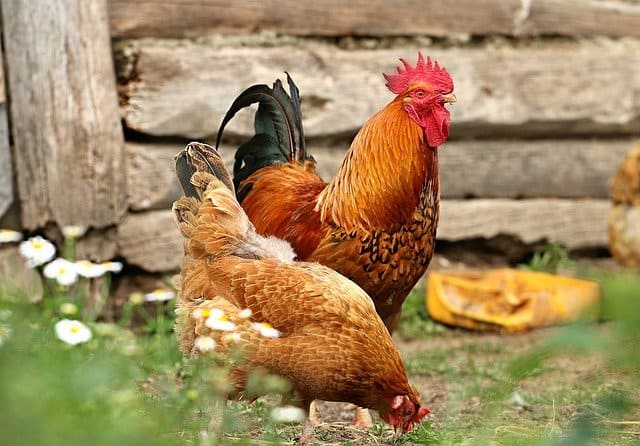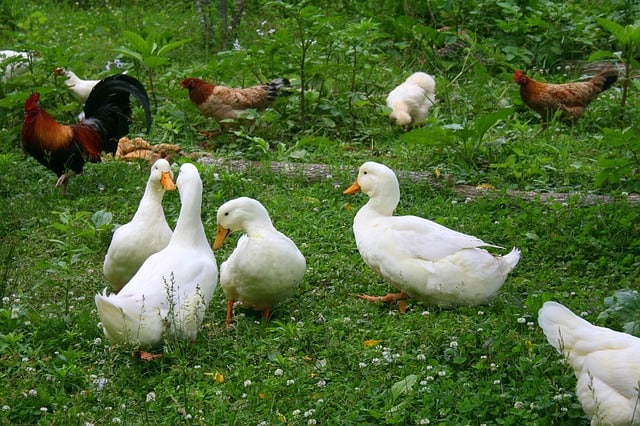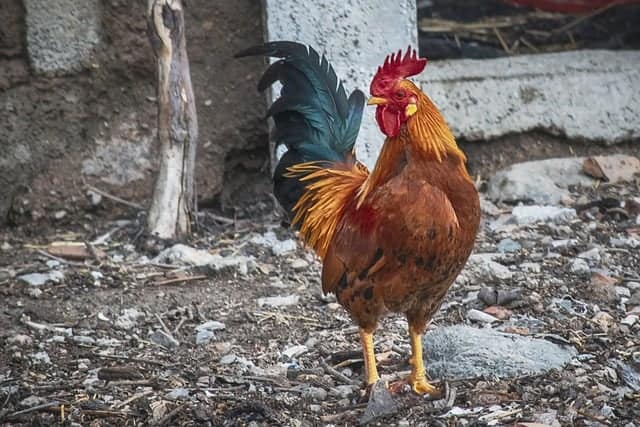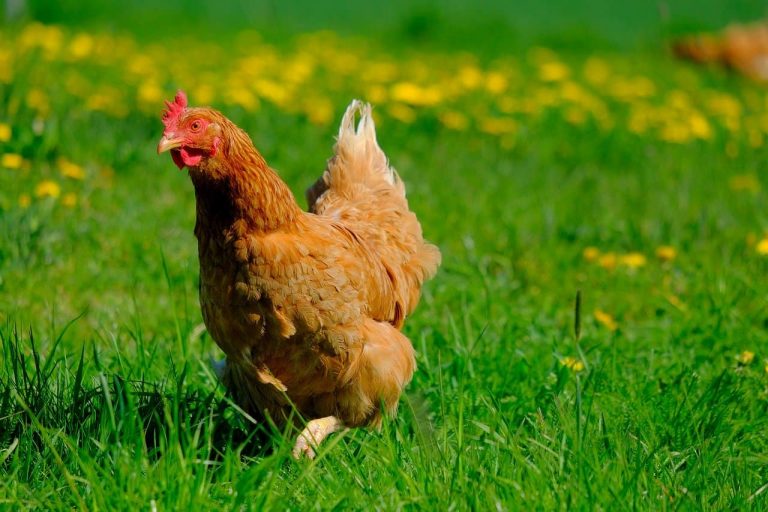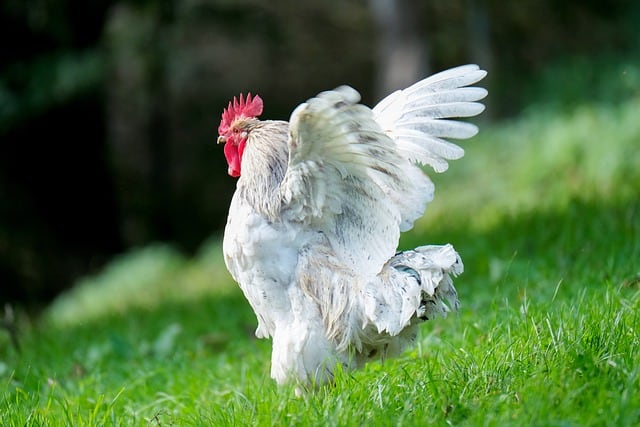Pork is one of the most delicious dishes for humans. Since chickens are also omnivorous, it wouldn’t be surprising to be tempted to give the leftovers of your cooked port as a treat. The question is, Can chicken eat pork?
The answer is yes; chickens can eat pork, but only if you feed it to them correctly. In this condition, it is entirely safe. It means you must prepare the port in a healthy way and serve it to the flock in moderation, as recommended by veterinarians.
In this post, we shall look into what makes port a good source of nutritional protein and fat for chicken, the best way to prepare and serve pork to fowl, the nutritional benefits of pig meat for chicken, and potential risk factors associated with the erroneous feeding of the birds on pork.
Contents
The Nutritional Value of Pork Compared to Chicken
Feeding pork to chickens can offer certain nutritional benefits, especially if done in moderation and as part of a balanced diet. Here are some potential advantages:
- Protein Source
Pork is a good source of protein, and including it in a chicken’s diet can help provide the necessary amino acids for growth, development, and maintenance of muscle tissue in the chicken.
- Nutrient Variety
Introducing pork as a protein source diversifies the nutritional profile of the chickens’ diet. Different types of meat offer varying amounts of vitamins, minerals, and other nutrients, so incorporating pork can contribute to a more well-rounded diet for the chickens.
- Energy Content
Pork tends to have a higher energy content compared to some other protein sources, which can be beneficial for chickens with high energy demands, such as during periods of growth or egg production.
Considerations For Feeding Pork to Chicken
It’s important to note that when feeding pork to chickens, it should be done with caution and in moderation, keeping a few considerations in mind:
- Balance and Variety
A balanced diet for chickens should include a mix of protein sources, including grains, legumes, and insects. Relying solely on pork or any single protein source may not provide all the necessary nutrients, so it’s important to offer a varied diet.
- Processing and Preparation
If feeding pork to chickens, it’s crucial to ensure that the meat is cooked thoroughly to eliminate any potential pathogens. Raw or undercooked pork can pose health risks to chickens, just as it can for humans.
- High-Fat Cuts
Be mindful of the fat content of pork. Feeding chickens excessively fatty cuts of pork can lead to imbalances in their diet and contribute to obesity or other health issues. Lean cuts of pork or trimming excess fat can be a better choice.
Remember, it’s always recommended to consult with a poultry nutritionist or veterinarian to ensure that the diet provided to your chickens meets their specific nutritional needs and requirements.
Correctly Preparing Port for Your Chicken
When preparing pork to feed chickens, it’s important to take a few precautions to ensure the safety and nutritional value of the meat. Here’s a general guide on how to prepare pork for chickens:
- Cook Thoroughly
It’s essential to cook pork thoroughly before feeding it to chickens. Raw or undercooked pork can contain harmful bacteria like Salmonella or parasites that can be detrimental to the health of chickens. Cook pork to an internal temperature of at least 145°F (63°C) to ensure it is safe for consumption.
- Remove Bones
Remove any bones from the pork before feeding it to chickens. Bones can pose a choking hazard and should not be included in their diet.
- Trim Excess fat.
If the pork contains excess fat, it’s advisable to trim it off. High-fat content can lead to imbalances in the chickens’ diet and contribute to obesity. Opt for lean cuts of pork or remove visible fat before preparing it for the chickens.
- Cook Without Seasonings
Avoid seasoning the pork with spices, herbs, or sauces that may not be suitable for chickens. Stick to plain, unseasoned cooked pork when preparing it for their consumption. Chickens have taste buds, but not like ours, and so we shouldn’t expect seasoning that tastes good for us to taste good for them.
- Cool Down Before feeding.
Allow the cooked pork to cool down to a safe temperature before feeding it to chickens. Feeding hot food can cause digestive issues in chickens. Besides, hot food retains lots of heat and can burn the bird’s beak and cause acute feeding problems.
- Portion Control
Provide the pork in appropriate portion sizes based on the number and size of your chickens. Overfeeding can lead to obesity or imbalances in their diet. Ensure that the pork is offered as part of a varied and balanced diet that includes other protein sources, grains, and fresh fruits and vegetables.
Remember, it’s always recommended to consult with a poultry nutritionist or veterinarian for specific guidance on feeding practices and to ensure that the diet meets the nutritional requirements of your chickens.
Potential Adverse Effects of Pork to Chicken
We have already seen how healthy and nutritious pork is for your chicken. There is no reason why you should hold back such vital nutrients from your flock. However, you must be aware of serving it wrongly. Feeding pork to chickens can have potential adverse effects if not done properly or in excessive amounts. Here are some considerations:
- High Fat Content
Pork can be relatively high in fat, especially if not trimmed properly. Feeding chickens and pork with excessive fat content can lead to weight gain, obesity, and related health issues. It’s important to choose lean cuts of pork or trim off visible fat before feeding it to chickens.
- Imbalanced Diet
While pork can be a valuable protein source, relying solely on pork or any single protein source can lead to an imbalanced diet for chickens. A diverse diet that includes other protein sources, grains, legumes, and fresh fruits and vegetables is crucial for meeting their nutritional needs.
- Seasonings and Additives
Many seasonings, sauces, and additives used in pork preparation can be harmful to chickens. Ingredients like garlic, onions, high-sodium sauces, or artificial additives should be avoided, as they can be toxic to chickens. Stick to plain, unseasoned cooked pork when preparing it for their consumption.
- Food Safety Concerns
Pork, if not handled, stored, or cooked properly, can harbor harmful bacteria like Salmonella or parasites that can cause illness in chickens. It’s important to cook pork thoroughly, ensure proper hygiene during handling, and avoid feeding spoiled or expired pork to chickens.
- Choking Hazard
Pork bones can pose a choking hazard to chickens. It’s essential to remove the bones completely before offering pork to chickens to prevent any potential choking incidents.
- Individual Sensitivities
Some chickens may have specific sensitivities or allergies to certain types of meat, including pork. Monitoring individual chickens reactions and health is important to identify any adverse effects that may arise.
Conclusion
It’s crucial to remember that chickens have specific dietary requirements, and their diet should be well-balanced, varied, and appropriate for their age, breed, and purpose (such as egg production or meat production). There are commercially formulated chicken feeds designed to provide the regular nutritional requirements. Pork should only be fed as a treat. Consulting with a poultry nutritionist or veterinarian can provide tailored advice for your specific flock to ensure their health and well-being.

